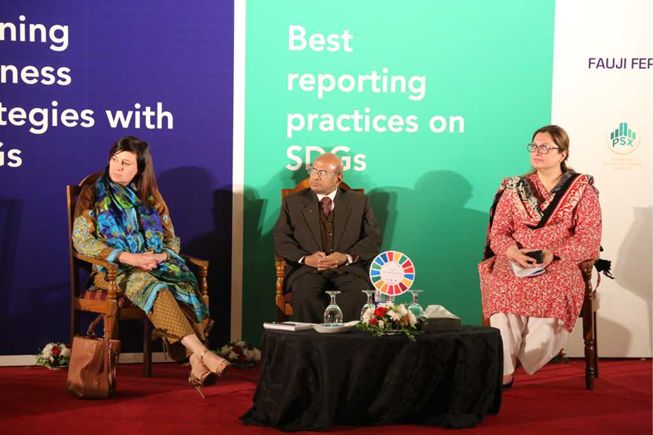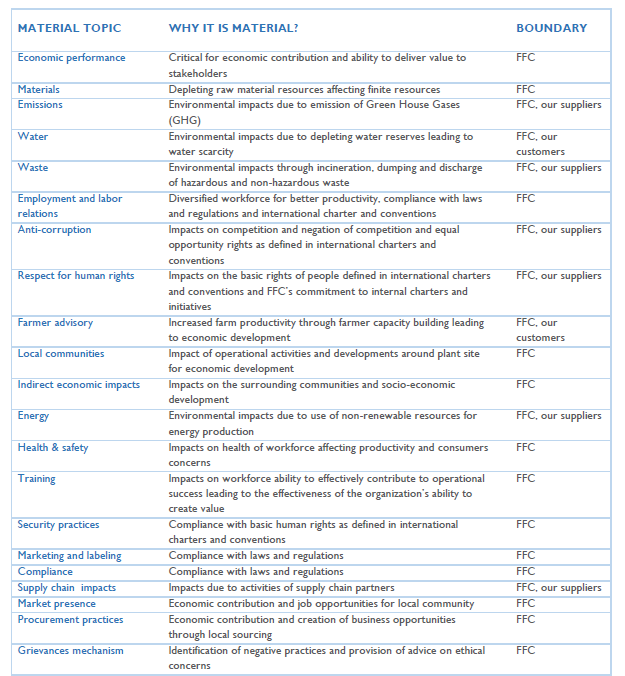Creating Value in a Sustainable Manner
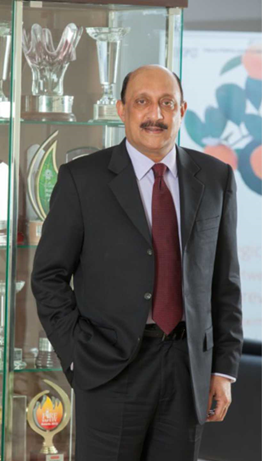
LETTER FROM THE CE & MD
Dear Stakeholders,
It gives me immense pleasure to share our Integrated Sustainability Report 2017 which reviews our value creation potential, how we create and share value with our stakeholders and our management approach for the most material economic, environmental and social impacts of the activities.
Given the evident economic and social benefits of sustainability and significant development in the field, the expectations are growing from business to align their strategies with sustainable development. The recent launch of Global Compact 3.0 by the UNGC and development of business reporting on SDGs is a call for business to use its position and expertise to not only deliver the financial returns but also to contribute in resolving greatest challenges faced by the world.
Though the year 2017 was full of challenges, however we managed considerable achievements and made new records of highest ever product off take and revenue in spite of certain inevitable factors, particularly reduction in urea subsidy per bag and change in taxation regime for imported fertilizer, which were beyond our control.
During the year, we achieved our second highest ever production of 2,500 thousand tonnes, only 10 thousand tonnes below record output of the previous year. Our urea market share remained at 52%. Through realignment of our strategies, which included export of urea and marketing of imported fertilizer, the sales revenue increased to Rs.97.31 billion – which is 24% higher than the previous year. Despite price constraints, increase in gas prices and inflationary impact of input costs, we managed to surpass the targets and achieved net earnings of Rs. 10.71 billion. Notwithstanding the challenging environment, we are focused on exploring new opportunities, optimizing cost and efficiencies and diversifying in order to keep providing sustainable returns to our stakeholders.
We continuously invest in environment friendly technologies and up-gradation of our plants to reduce our environmental footprint. However, in 2017, the environmental impact of our operations slightly increased as compared to previous year on account of due plant turnaround. During the year, energy consumption at plant sites increased by 154,593 GJ and water recycling decreased to 56.81% from 60.29%. Intake of fresh water increased by 6.4% due to reduction in water recycling however, the GHG emissions decreased by 4,876 MT. We are determined to curtail the environmental footprint in line with global standards as our targets in the coming years. Our emphasis on health and safety resulted in almost zero health and safety incidents at plant sites during the year.
Our stakeholders are vital for our success and we are committed to creating and share value with them through our activities and impacts. During the year, we spent almost 1% of our after tax earnings on our community welfare activities focused on education, health, poverty alleviation, national cause donations and socio-economic development. In order to strengthen our value creation potential and manage our impacts in supply chain, we are working with our partners in the areas of environment, labor practices, human rights and societal interventions.
In line with our commitment to transparency, we are continuing to use the IR framework along with the GRI Sustainability Reporting Standards and the UNGC Ten Principles to share our value creation potential and performance on economic, environment and social fronts. Our report is also aligned with Sustainable Development Goals demonstrating our contribution towards SDGs.
We uphold our support to the Ten Principles of UNGC and UN SDGs by aligning our activities and playing our role in meeting the ultimate goal of sustainable development.
Finally, I thank our stakeholders for their continued trust reposed in us and I invite you all for your valuable feedback.
Lt Gen Shafqaat Ahmed HI (M), (Retired)
Chief Executive & Managing Director
EXTERNAL ENVIRONMENT
Our external environment is constantly changing and has resulted in volatility on the political, economic, technological, environmental and social fronts.
Political and macroeconomic
Global growth outlook during the last year remained dull, with increasing protectionist measures by US and ongoing Brexit talks with EU. However, growth in Pakistan’s economy is on the rise for the last four years due to economic turnaround and ongoing China Pakistan Economic Corridor (CPEC) projects. The GDP grew at 5.28%, the highest during the last ten year. However, the increasing government borrowings, declining foreign exchange reserves, weak political situation and upcoming elections portray a risky picture for business due to possible further depreciation of Pakistan rupee, increasing inflation, and increasing interest rates.
The agriculture sector’s performance remained slow but due to timely implementation of supportive government policies and increased credit disbursement for agriculture sector helped in stable growth in this sector. However, the ongoing payment crises faced by farmers may limit the purchasing power of the farming community and affect fertilizer uptake for the upcoming sowing season.
Social
Despite stable growth over the years, rising per capita income and growing middle class in Pakistan, social, environmental and economic challenges, such as poverty, limited resource, climate change, inequality and unemployment existed. The employable youth lack access to employment opportunities, people lack access to food, clean water, basic health facilities, education and sanitation. Existence of under-privileged and deprived population poses a challenge for Government to provide basic facilities for uplifting the lives of these communities. At the same time it places a responsibility on businesses to support government and reap the dividends by aligning business strategies to solve these problems.
Environmental
Protecting the environment – reducing negative impacts of operations – contributing to the development of renewable energy resources, sustainable food and clean water are vital. If we do not act now, we could compromise the ability of future generations to meet their needs. Globally as well as in Pakistan, climate change is causing devastating floods, droughts and affects crops’ growing patterns resulting in productivity loss and pushing up food inflation. The decreasing water level in most parts of Pakistan, resulting in water scarcity, is an important issue which requires immediate steps. The increasing use of renewables and decrease in cost of clean technologies has helped in managing energy crises in Pakistan. However, plants running on coal will lead to affect the climate adversely.
Regulatory
The recently introduced Companies Act 2017 and the Code of Corporate Governance for listed companies, along with ongoing directives by the regulator, are increasing the compliance requirements for the corporate sector in Pakistan. The ongoing international debate on non-financial reporting, investor specific reporting, is expected to introduce new codes and regulations in Pakistan. The increased regulatory requirements in this regard will shape the agenda for corporate sector and will increase the cost of compliance.
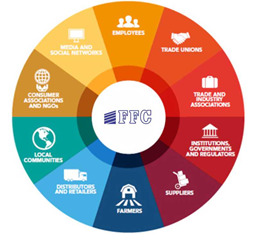

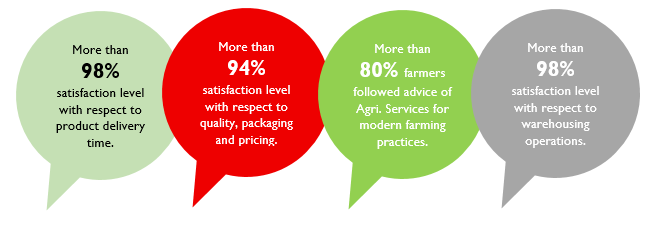
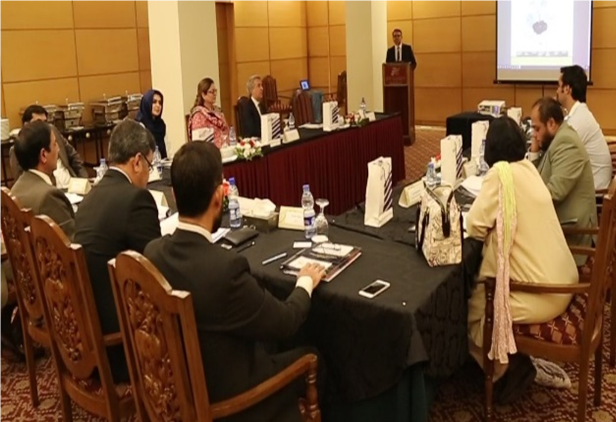
STAKEHOLDERS’ ENGAGEMENT
Value creation requires integration of expectations and interests of stakeholders in decision making. Our continuous commitment to engage with our stakeholder helps us to understand their concerns, devise appropriate strategies and deliver to the expectations of our stakeholders.
The first and significant step in an engagement process with stakeholders is the identification of relevant and important stakeholders. We identified important stakeholders by considering those groups or individuals which can be significantly affected by our business activities, outputs or outcomes, or whose actions can be expected to significantly affect our ability to create value over time. The identified stakeholders were profiled, mapped and prioritized for consultation based on factors of influence, responsibility, proximity, dependency, willingness to engage and representation. Consultation with stakeholders’ groups is carried out on continuous basis by the relevant departments.
Knowledge of stakeholders’ concerns and exact requirements of customer base helps to respond to their concerns and gain economic success on a sustained basis. Customers are of prime importance to us as we provide support in the use of our products and gather feedback from farmers through our extended Agri-service department. We conduct customer satisfaction survey on a biannual basis. The survey comprises of a questionnaire to measure the level of customer satisfaction on aspects of quality, operations and products offered, focusing on the entire product portfolio across the marketing area network of Pakistan. During the year, two customer satisfaction surveys were carried out in January and June 2017 respectively. The surveys were conducted by selecting dealers as sample size from the entire marketing area across Pakistan, covering all 13 FFC regions.
Engaging stakeholders throughout the year benefits us in identification of negative impacts of our activities and expectations of our stakeholders, which helps us to take appropriate steps for effective management of impacts in timely manner. We consulted the following major groups throughout the year as well as for Sustainability Report 2017.
In line with our previous practice of report specific stakeholder engagement, we identified important stakeholder groups, prioritized those groups for engagement, defined communication methodologies for each group and carried out engagement with them to gain insights for identification of material topics. The stakeholder groups were engaged through email, phone and a focus group meeting.
This year, we carried out a report specific engagement with investors, analysts, financial institutions and Pakistan Stock Exchange to get investors’ perspective to inform materiality determination and our value creation. The investor community along with analysts showed keen interest in the engagement and actively participated in the discussion on Sustainability Report 2016 and the additional disclosures for the report 2017.
The details of stakeholder groups consulted, the topics identified by them and our response are as follows:
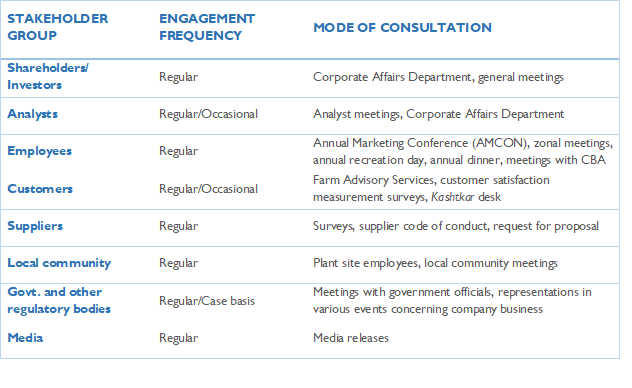
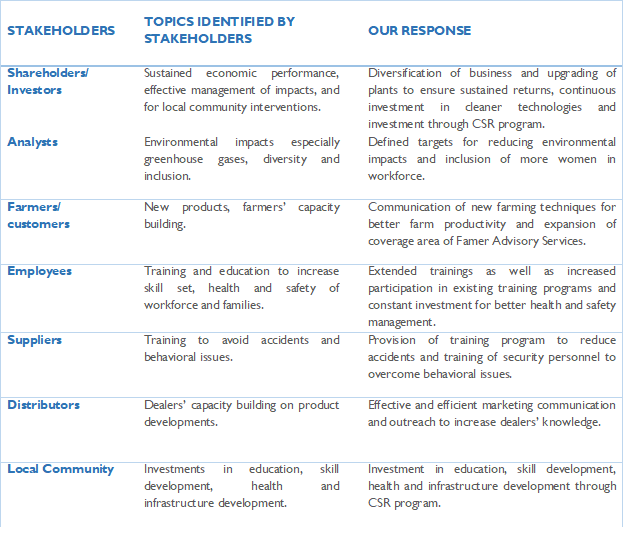
MATERIALITY ASSESSMENT
We aim to create value addition and benefits to all stakeholders through timely identification, prioritization and management of impacts, risks and opportunities. Our sustainability efforts are focused in areas which represent our significant impacts on the economy, environment and society, critical for our ability to create value over short, medium and long term and which have been defined as important by various stakeholders.
The reporting principles of sustainability context, materiality, completeness and stakeholders’ inclusiveness were used for defining our report content. These principles have been consistently applied at varying degrees during identification, prioritization and validation steps, while defining material topics for this report.
Based on the results of the stakeholders’ engagement, review of industry specific issues, and internal analysis, a materiality analysis was carried out to produce a materiality matrix containing the material sustainability issues for our operations. This analysis has allowed us to identify the most relevant topics which reflect significant economic, environmental and social impacts and greatly influence our value creation ability and the assessments and decisions of our stakeholders. The prioritization of the risks is based on the materiality analysis for non-financial risk as per IR framework, GRI Standards and best available practices for defining material topics. Through the materiality analysis, we consider the severity and likelihood of such a potential risk, and establish relative risk levels to guide our mitigation activities. The CSR Committee analyses the risk identified and recommends action to the relevant departments for prevention and mitigation of the negative impacts of the operations and maximization of opportunities. Compliance with laws, international standards, internal regulations, and FFC’s code of conduct is a basic requirement for all activities as part of the precautionary approach. The validation of material topics was carried out by CSR Committee which is responsible for sustainability related activities. The reporting principles of defining report content i.e., completeness and stakeholders’ inclusiveness were applied while validating the material topics for the FFC 2017 Sustainability Report.
The resultant material topics are the typical kind of activities which successful chemical companies develop, such as plant, process and product safety, environmental protection, health and safety and making investment for uplift of the plant site community. Although FFC is a leader in all these areas in its sector, it is still focused on moving ahead for playing its role in sustainable development.
The matrix divides up the areas to show those which have high impacts and those which have moderate impacts of FFC’s activities and which are highly relevant and those which are moderately relevant to its stakeholders. The content and scope of this report is also derived from this matrix.
The boundaries for material topics have been identified on the basis of their impacts whether lying within or outside the organization. The reporting principles for defining report content have been used while identifying the boundaries for material topics.
FFC’s has witnessed a positive progress on material sustainability issues over the period through more efficient water usage, improvement in energy consumption, better health and safety facilities and intervention in the fields of health, education and poverty alleviation in the local community. However, the environmental impact for the current year increased on account of the planned plant turnaround. We are strongly focused to mitigate the financial impact of these risks and create shared value through focusing on the opportunities.
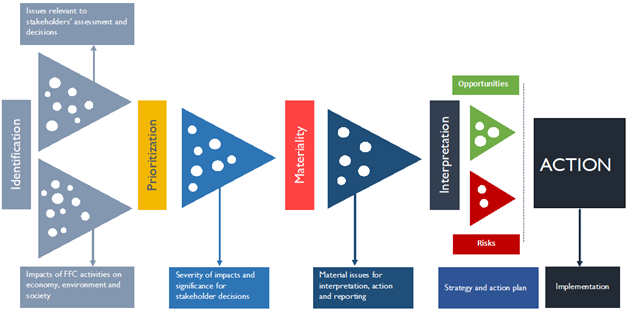
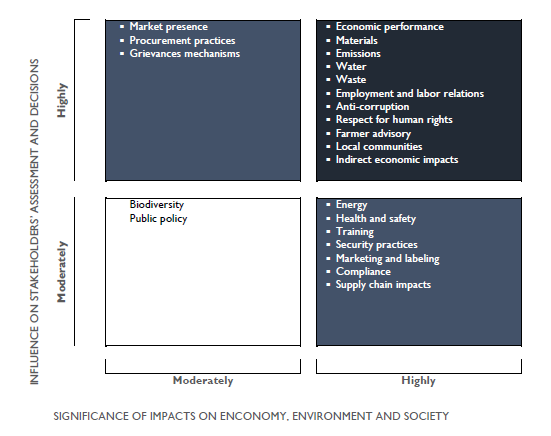
STRATEGY AND RESOURCE ALLOCATION
We believe that sustainable value can only be achieved through efficient use of resources, developing sustainable products, promoting responsible consumption and treating environment and people fairly and with respect. This attitude opens up opportunities and sets us apart from our competitors resulting in higher level of revenues, customer appreciation, acceptance and increased demand.
Our strategy and management of the value creation process help us to achieve our reputation among investors, be they be shareholders or providers of debt capital, customers, and our business partners. Our investors appreciate the fact that their investment is designed to generate value over different time horizons. Although the initial investment on sustainable value creation is higher, careful planning and implementation leads to generate higher revenues which offset or exceed the initial investments in the medium to long term. Our investment in sustainability aims to minimize the quantity of material we use and cut overall costs, make the company qualified to attract highly-skilled employees and investors, and to improve product quality and the company’s image amongst its customers. As such, sustainable value creation, in its broadest sense, has become a key criterion for good corporate governance. Our governance approach for sustainable value creation is covered in the governance section of this report.
We envisage sustainable value creation as a process of change in which use of resources, goals of investment, direction of technological development, and institutional changes are not only in synchronization with each other but also increase current and future potential to create value. We are working to integrate sustainable value creation in our business processes for achieving our goal of shared value through efficient business management.
We have developed programs, initiatives, and long-term measures in all key areas as a means of achieving the goals which we have set for ourselves whilst also increasing the benefit for all stakeholders. As a leading fertilizer manufacturing company, we do not limit our sustainability efforts in compliance with statutory regulations but have also committed to an ethical and sustainable conduct in all of our commercial activities. All our actions comply with the applicable laws, principles laid down in the UN Global Compact and our internal code of conduct. We strive for a business culture of continuous improvement, sustainable competitiveness and top performance in line with our ethical standards. In all of our activities, we put emphasis on environmental protection and safety. We are continually striving to improve in terms of economic, environmental and social sustainability to create value through efficient use of our capitals.
CORPORATE LEADERSHIP CONVERSATION ON SDGS
The 17 Sustainable Development Goals (SDGs) were formally adopted by the UN member states during the SDGs Summit at the UN on 25-27th September 2015. Pakistan is one of the first countries in the world to have adopted the SDGs through a unanimous resolution of the parliament. The 17 SDGs aim to leverage the linkages between economic development and human well-being to improve the situation of People (human development), Planet (environment), Prosperity (economic development and poverty alleviation) and Peace (peaceful and tolerant societies) by 2030.
The Sustainable Development Goals (SDGs) embrace a universal approach to the sustainable development agenda and explicitly call on business to use creativity and innovation to address development challenges.
FFC, recognizing the importance of SDGs and role of corporate sector in 2030 Agenda of Sustainable Development, organized a corporate leadership conversation on SDGs at Karachi. The purpose of the conversation was to initiate a discussion on alignment of business strategies with SDGs and reporting business contribution in meeting SDGs. The event was organized in collaboration with Corporate Social Responsibility Centre Pakistan (CSRCP), Pakistan Stock Exchange and United Nations Global Compact, Pakistan Network.
The corporate leadership conversation on SDGs engaged corporate leaders, UNGC representatives, government officials and non-profits to discuss as to how corporate sector can align its business to support sustainable development and report its contributions to SDGs in order to monitor the progress and take appropriate strategic and operational decisions.
Eminent speakers and panelists discussed aligning business activities to support the global goals and tap the multi-trillion USD opportunities in shape of revenues and cost saving offered by the SDGs. The need of reliable, comparable and transparent information representing impacts and contribution of business activities on the SDGs was also emphasized.
FFC is committed to not only aligning its business activities in line with the SDGs but also playing a wider role to inspire corporate sector to follow the agenda of sustainable development for a better and a prosperous world.

